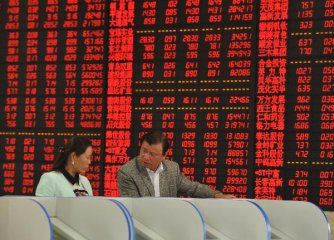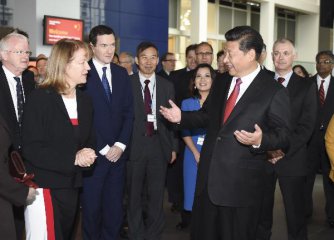With steady steps, China has been pushing its currency to wider use on the global stage, and it has taken a big stride forward with President Xi Jinping's state visit to Britain.
On Wednesday, China's central bank announced it has issued 5-billion yuan-denominated notes in London, in the first offshore issuance of such debts outside China.
The interest rate of the one-year notes was set at 3.1 percent. "The move is an important part of the yuan's globalization strategy to increase its presence in the global bond market," said Sang Baichuan, director of the Institute of International Business at the University of International Business and Economics.
Since July 2009, when China introduced a pilot scheme allowing for yuan settlements in cross-border trade, the currency's overseas footprints have been expanding fast, especially for use in international trade.
The RMB became the world's No. 2 currency for trade finance globally in 2013, and overtook the Japanese Yen to become the fourth most-used world payment currency in August, only after the U.S. dollar, the euro and the sterling, according to global transaction services organization SWIFT.
It has also been used as a reserve currency in some countries. Yet to make it a true international currency, China has more to do to offer diversified investment products for the redback, analysts said, nevertheless hailing the central bank note sales in London as an important step.
Yang Tao, assistant director of the Institute of Finance and Banking under the Chinese Academy of Social Sciences, said the move in the financial hub of London will promote the yuan as an investment currency in international finance.
Previously, China has mainly issued offshore RMB debts in Hong Kong. With the foundation laid out, analysts believe there is a strong possibility of the yuan being included in the IMF Special Drawing Rights (SDR) basket later this year.
The two key criteria for SDR entry are the value of a country's total exports and imports, and whether a currency is fully convertible under the capital account. The IMF reviews the currencies in the SDR basket every five years.
At the last SDR review in 2010, the yuan met the first criterion, but was assessed as not meeting the "freely usable" criterion. Wednesday's announcement is the latest in a series of financial agreements between China and Britain.
Last year, Britain became the first Western country to issue a yuan-denominated sovereign bond. In a visit to China last month, Chancellor of the Exchequer George Osborne stressed that Britain supports the internationalization of the RMB and wants to make London the Western hub for RMB trading.
The country will also launch a feasibility study into linking the London and Shanghai stock markets, potentially adding a new channel for offshore investors to expand their exposure to yuan-denominated securities. England's capital, as the traditional financial center, also stands to gain from the cooperation.
"Diversified yuan businesses in London will help strengthen the city's market infrastructure and cement its position as a financial hub," Sang said. Apart from Singapore and Hong Kong, Britain is already the biggest offshore RMB market.
More than 50 percent of yuan foreign exchange trading outside China and Hong Kong is done in Britain, according to SWIFT. . Editor's note: Chinese President Xi Jinping is paying a state visit to Britain on Oct. 19-23, the first by a Chinese head of state in a decade.
Xinhua is wiring a series of in-depth stories on Chinese-British relations and the visit. You can follow our special reporting on Twitter, Facebook and YouTube: http://twitter.com/XHNews http://www.facebook.com/XinhuaNewsAgency http://www.youtube.com/user/ChinaViewTV
























Latest comments